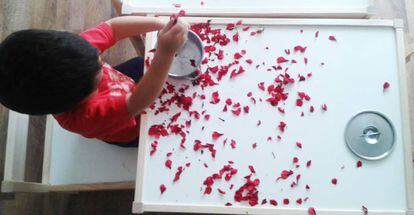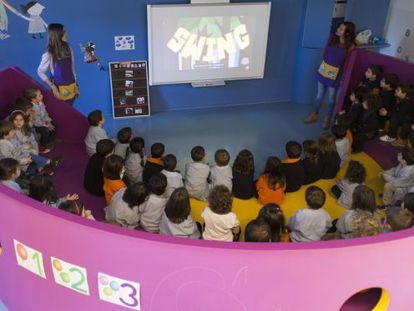The stay-at-home moms creating a schooling network in Madrid
The 'madres de día' care for children up to four years old using alternative education methods

“We started as three, and now we’re 75,” María Feros says enthusiastically, talking about the growth of Red Madres del Día, the company she started in 2013 that brings together professionals who watch children during the day from their own homes. Feros is an educator with over 20 years of experience in state-run nursery schools and nine years of experience as a madre de día (daytime mom), where she cares for up to four children four-years-old or younger while the parents are at work. In her house, nothing is out of children’s reach, and she lets them decide their own activities. According to her, the best thing to do is just to be with them, respecting their curiosity and their time. The children arrive to her house in the Madrid neighborhood of Ciudad Lineal around 8.30am, and they leave early in the afternoon. “The bonds they form are spectacular.”
In addition to the 75 workers with Red Madres de Día, there are 45 more caregivers who have been using the Waldorf method (developed by educator Rudolf Steiner at the beginning of the 20th century) for 15 years here in Spain. The spread of this kind of alternative care ties in with a wider trend in Spain, with up to 800 projects currently dedicated to different steps in the formation process. Almudena García is the creator of the website Ludus, a directory that gathers information on these alternative education projects. She explains that the majority of them are intended for children six-years-old or younger, and they represent an array of different philosophies. The most popular are those of Steiner and Maria Montessori, the Italian physician who developed an approach based on independence and self-teaching. Then there are the approaches referred to as “democratic” or “green.”
The best thing to do for children is just to be with them, respecting their curiosity and their time.
María Feros
For children spending the day with a madre de día, every morning starts with breakfast then free play time. “Some grab a toy car, others help me clear the table with a dishcloth,” Feros says. Rain or shine, every day the children play outside, bundled up as they hop from puddle to puddle. Later, at the park, they’re free to climb trees, balance and run. “We take advantage of this walk to get to know the neighborhood: the gardener at city hall, the owner of the bar,” she added. Once back home, the kids eat, “slowly, each one at their own pace,” then take an afternoon nap.
Belén Basilio, 36-years-old, is self-employed and had no doubts when deciding who to leave her second daughter Luisa with. This July, her eighteen-month-old daughter Luisa is finishing her first year in the house of a madre de día. “My older daughter stayed with me until she was three.”
Basilio never considered enrolling her daughter in a traditional nursery school, and this alternative seemed like “the perfect option.” The price for a madre de día from Red can run between €400 and €500 a month, while the options using the Waldorf methods are closer to €360. Basilio adds that while the price puts somewhat of a strain on her family, giving Luisa the chance to experience a unique brand of early education is worth the cost. “If I could have, I would’ve stayed home with her,” she emphasizes. Her older daughter is enrolled in a Waldorf high school – the families that opt for these alternative options usually stick with them through high school, explains Antonio Malagón, president of Spain’s Association for Waldorf Schools. This minimizes the problems that can arise when a child accustomed to a lot of freedom is suddenly told to remain seated all day. “They tend to develop into very flexible and adaptable children,” he adds.
And what about the padres de día?

The men taking on the roles of papás de día in Spain can be counted on the fingers of one hand, but José Guzmán insists that he hasn't faced any kind of discrimination. For him, everything changed after the arrival of his son Guillermo. Forty-years-old with 10 years of infant teaching experience, last June he decided to open his house in Las Palma de Gran Canaria to other children as well. "Guillermo was two," and he had to get used to "sharing his dad with the other kids." His first year as a papá de día ended in August, with the results exceeding his expectations.
Because of his initiative, some other fathers have joined under the association Boskeko. "We all share this idea for a different education for our children," he explains. "What I'm trying to do is make sure the kids play, explore, enjoy." He says that next year he will be putting a project into action inspired by what's called 'green pedagogy,' saying, "I want the classroom to be outside, changing every day."
Lacking legislation
These formative experiences have been evolving in Spain without any sort of specific legislative frameworks. The one community with a law regulating the activities of the madres de día is Navarra, which from 2006 to 2012 subsidized its diffusion; the Madrid regional government regulated the service through an order in October of 2015. “It’s easier to start these projects with young children,” states Antonio Ruiz, president of the Association of Free Education, explaining that the rules become less flexible as they get older. However, he laments that, in general, legislative frameworks stand in the way of this kind of alternative education. In many cases, the madres de día hold shorter schedules than those of traditional nursery schools, because they insist that it’s not ideal for children to be out of the house all day, explains Almudena García – even if they never really left. “This is how it always used to be done, except this is better, because these women are professionals and they can guide the development of our children even better than we can,” says Basilio.
Sign up for our newsletter
EL PAÍS English Edition has launched a weekly newsletter. Sign up today to receive a selection of our best stories in your inbox every Saturday morning. For full details about how to subscribe, click here.
English version by Allison Light.












































